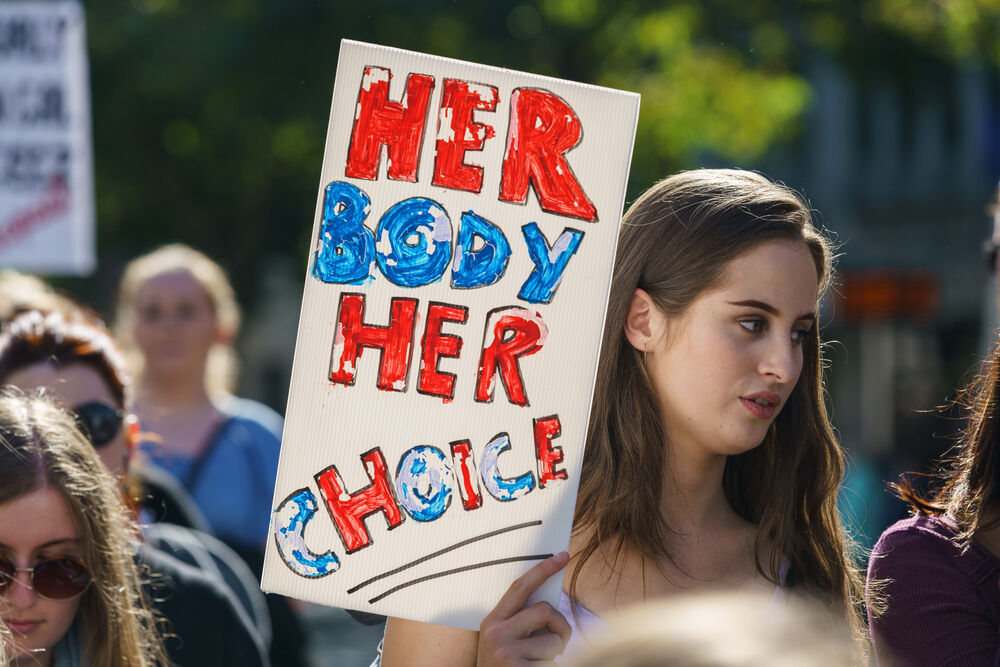In 1956, my mom dropped out of her Texas high school during her senior year because she was pregnant with me. There were no alternative schools available for pregnant students in those days and abortion was illegal across the country. If my mom could choose between staying in school and having me, it’s very likely I would not be here. While painful to contemplate, I believe wholeheartedly she should have been able to make that decision – even if it meant I was never born.
That’s why today is painful for me and the millions of Americans who lost the ability to make decisions about our bodies last June. Overnight, the Supreme Court – a majority male, heterosexual institution – overturned Roe v. Wade, stripping us of our right to bodily autonomy.
Related:
The Supreme Court overturning Roe is just the latest consequence of Christian domination of America
The U.S. government spends over $400,000 for chaplains to work in Congress because America never took the separation of church and state seriously.
I’ve been out as a lesbian since my teens. I’ve never had to struggle with a decision of whether or not to have an abortion, but I have always understood why that right should matter to me. What more personal – more private – space do we hold than our own bodies?
Never Miss a Beat
Subscribe to our newsletter to stay ahead of the latest LGBTQ+ political news and insights.
To those who continue to fail to connect the dots between LGBTQ+ equality and reproductive justice: wake up. Not only do lesbian and bisexual women have more abortions than our heterosexual peers, but the right to privacy and bodily autonomy are also fundamental to a host of LGBTQ+ rights, such as gender-affirming care and marriage equality.
That’s why in his concurring opinion, Justice Clarence Thomas was not satisfied with just overturning Roe. He said the quiet part out loud: he wants the Supreme Court to “reconsider all of this Court’s substantive due process precedents, including Griswold, Lawrence, and Obergefell,” cases that safeguarded the right to contraception, struck down anti-LGBTQ sodomy laws and guaranteed marriage equality.
When the LGBTQ+ community read Justice Thomas’ opinion, we saw it for what it was: a threat.
Since then, 20 states have moved to restrict or ban abortion. In states like Florida and Texas, lawmakers moved to make restrictions on abortion and contraception even more draconian. This call to limit bodily autonomy is why we’ve also seen a historic number of anti-LGBTQ+ bills. In the 2023 legislative session, over 490 anti-LGBTQ laws were introduced in state legislatures according to the ACLU, forcing 40 percent of trans adults to consider moving in the past year.
This wave of bans on gender-affirming care, abortion, and contraception is not about protecting kids or the sanctity of life. The playbook has remained the same since I was an activist in the 1970s. This is about politicians telling trans and non-binary people what health care they can and cannot access. This is about politicians forcing thousands of people to carry unwanted pregnancies, which poses serious threats to trans men in particular. This is about control.
When my wife Kathy and I made appointments for each of our teen daughters to see Planned Parenthood counselors to get sex education and facts about birth control, it was a decision made between us, our daughters, and their doctor. The last person I’d want in that decision is a politician.
My granddaughters won’t have the same liberties my daughters had during those critical visits – unless we do something. Take, for instance, states like Colorado and Massachusetts, where lawmakers – many of whom are LGBTQ+ – are fighting to pass shield laws to legally protect people traveling out of state for reproductive and gender-affirming care. We know when a person cannot receive the care they need, they either obtain it via unofficial channels or in cities and states where the care remains legal. These burdens are particularly acute for trans people, who are disproportionately low-income and must travel multiple times or permanently resettle in order to receive gender-affirming care over an extended period of time.
While “success” may look different depending on locality, an intersectional approach remains paramount. For the pro-choice movement, LGBTQ+ rights movement, and racial equity movement – this is a shared fight. Whether you are a woman, a member of a queer or interracial couple, a trans person, a parent, or an ally, we all have a stake in safeguarding privacy and bodily autonomy.
The far-right’s best chance is if we allow ourselves to be divided. That cannot happen.
Not only are these rights sacred to the fabric of who we are as a nation, but they are also winning issues. In 2022, voters elected a record number of pro-choice LGBTQ+ candidates for a reason: they are fed up with fear-mongering and bans on essentials like books and health care. It’s why I am more confident than ever that history, though often painfully slow, will ultimately be on our side.
The man whose name was on my birth certificate – a name I no longer carry – was my mom’s high school sweetheart. He was at one time very politically active and part of the so-called pro-life movement in Texas. Yet he stopped paying child support when I was three and did not contact me again until I turned 30. The hypocrisy – and parallels – are obvious.
As the war on privacy and autonomy continues to heat up, it’s clear the futures of LGBTQ+ equality and reproductive justice are forever intertwined, fused in the American belief that government has no business infringing on a person’s right to make decisions about their own bodies. To Justice Thomas, if you’re listening, let me be clear: we are not going back.
Annise Parker is President & CEO of LGBTQ+ Victory Fund, the only national organization dedicated to electing pro-choice LGBTQ+ candidates to public office. She is the former mayor of Houston, Texas and was the first out LGBTQ+ mayor of a major U.S. city.















